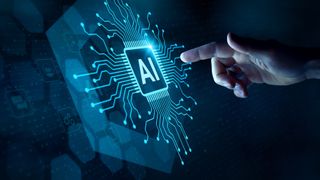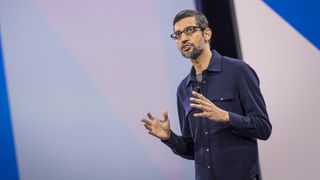- Sundar Pichai predicts a slow year for AI in 2025
- Says we'll need "deeper breakthroughs" to get to the next stage
- Many agree, but OpenAI CEO has publically suggested there won't be an AI development slow down
Artificial intelligence has ruled the roost in 2024, with pretty much every major tech brand announcing AI tools and upgrades for our phones, laptops, TVs, smartwatches, and pretty much everything via partnerships with ChatGPT or one of the best ChatGPT alternatives. 2025 looked set to continue this trend, but Google CEO Sundar Pichai instead believes we’ll see AI developments tail off now that the “low-hanging fruit is gone.”
Speaking at the New York Times’ DealBook Summit, Pichai said “I think the progress is going to get harder,” adding “you’re definitely going to need deeper breakthroughs as we get to the next stage.”
As Pichai sees it, the explosion of new features and rapid advancements we’ve seen will slow down in 2025 as we reach the current limit of AI systems – a limit that will only be surpassed by heavy investment and development that will take time to bear fruit. Until we achieve the next major breakthrough, Pichai argues that we’ll see more incremental improvements that may improve the technology, but won’t necessarily redefine what AI systems can do like we’ve seen these past 12 months.
And he’s hardly alone in this sentiment. A couple of months ago, Microsoft CEO Satya Nadella likened AI development to the Industrial Revolution in that growth takes time before it explodes (via CNBC), journalist Edward Zitron’s latest newsletter post goes into a fantastic long deep dive into the struggles facing AI development, and our in-house expert Senior Editor Graham Barlow said of Pichai’s comments: “I think he’s right.”
Pichai’s sentiment isn’t held by every AI-focused company, though – at least publicly. Back in November OpenAI CEO Sam Altman posted “There is no wall” suggesting he believes AI advancements will continue at a breakneck pace. His post was a response to criticism that the most recent ChatGPT update was only slightly better than the model that came before.
However, behind closed doors there are reports (via Bloomberg, behind a pay wall) that OpenAI, as well as Google and Anthropic, are having a hard time advancing their AI systems and are struggling to achieve internal milestones.

Don’t expect AI to disappear
Given the nature of breakthroughs, it can be hard to predict when the next one will happen. It could be that some massive advancement is discovered in five months, or it could take five years as different avenues are explored. However given the potential of AI systems, it’s unlikely that the hype and excitement around AI will disappear completely any time soon even if notable advancements are few and far between for a while.
That’s not to say the excitement won’t die down. As different AI from Google, OpenAI, Microsoft, Apple and the rest approach our existing wall and homogenize, we’ll likely see the industry shift focus to a different technology for a while, as we always have.
Just look at XR tech. Google Glass made a splash in the mid 2010s, followed by the first actually impressive consumer VR headsets from Oculus and HTC. Then things relaxed in terms of the public’s perception until we got the Oculus Quest 2 and Meta’s massive Metaverse announcement, which triggered a new flurry of interest in the industry buzzword before returning to normal. Now, as we approach 2025, that excitement could return with Google and Samsung believed to be gearing up to showcase some kind of glasses or headset at the Samsung Galaxy S25 launch event in January.
AI is merely following this long-standing tech industry trend cycle, and while AI might be about to enter its ebb-era it will eventually flow back. So enjoy the calmer AI updates in 2025 while you can, because even if it fades more into the background artificial intelligence excitement will return.










 English (US) ·
English (US) ·